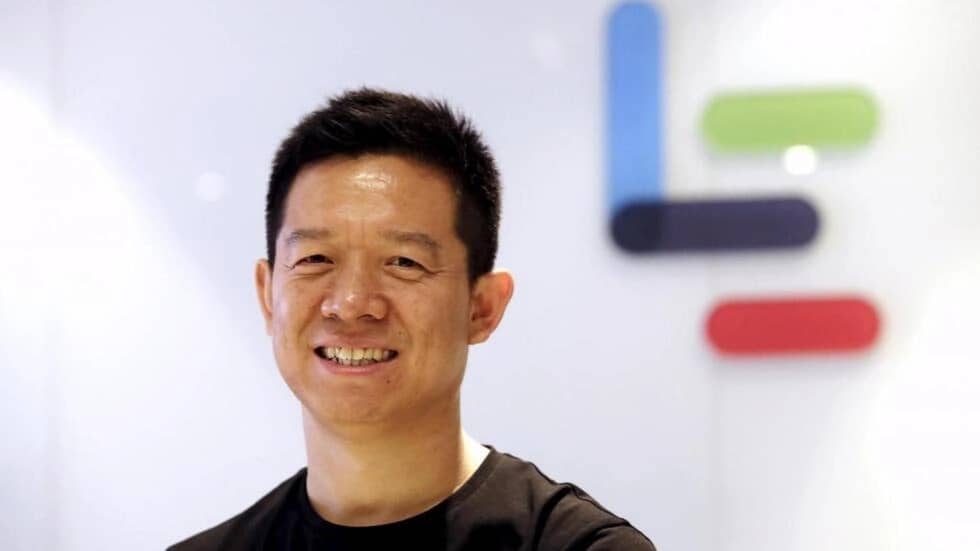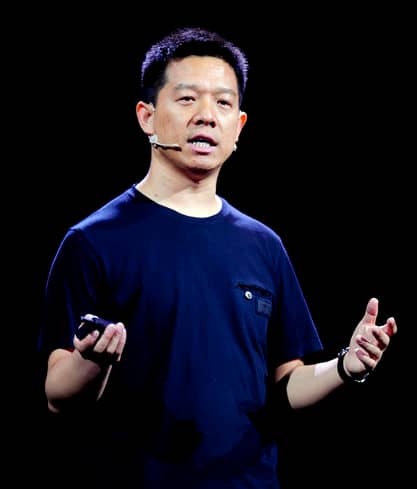In the spring of 2024, the competition in China’s electric vehicle industry reached a fever pitch. Many people on Douyin have seen a middle-aged man in black with a buzz cut, steady and capable, calmly introducing his company’s electric car to the camera: stylish design, superior performance. His words are full of entrepreneurial passion, making some wonder if he’s yet another CEO from a new car-making venture. Those who know him have already posed the soul-piercing question: “Accountant Jia, will you return to China next week?”

.
He is Jia Yueting, the founder of LeEco, a highly controversial businessman. Starting as a network administrator in a small town, he led his company to rapid success, creating a 170 billion RMB business empire in six years. However, he is also called the “God of Decline” because those associated with him tend to face misfortune. The LeEco empire collapsed rapidly under his watch, causing countless investors and suppliers to lose everything, dragging half of China’s entertainment industry celebrities and several industry moguls down with it.
Even after fleeing to the United States, his story continued: in 2024, Jia Yueting frequently made headlines due to his new entrepreneurial project, the “Faraday Future” electric vehicle. So, how exactly did the LeEco empire crumble? Can Jia Yueting make a comeback?
Jia Yueting hails from Beigaoyu Village, Fencheng Town, Xiangfen County, Shanxi Province, a village primarily based on agricultural economy. However, Shanxi is most famous not for its agriculture, but for its Jin Merchants’ culture. Active during the Ming and Qing dynasties, Jin Merchants specialized in trading salt, tea, cloth, and medicinal materials, with their footprints spanning the entire country. Through their trading activities, they accumulated substantial wealth, leading to the establishment of banks. Over five hundred years, the banks founded by Jin Merchants, with their extensive business scope, left a profound commercial culture in Chinese history.

.
Later, some people commented on Jia Yueting, saying that Shanxi people are famous for running banks, and Jia Yueting is particularly daring when it comes to money.
Jia Yueting’s father was a teacher, and his mother was unemployed, with the family’s only income coming from his father’s meager salary. Born in December 1973, he was the youngest child in the family, with an older sister named Jia Yuefang and an older brother named Jia Yueming. Believing that an unassuming name would be easy to raise, his parents gave him the rustic nickname “Niuwawa” (Little Bull Boy). They hoped he would grow up strong like a calf and lead an honest, diligent life. However, neither of these hopes materialized.
As a child, Jia Yueting was very small and weak, so his parents spoiled him and rarely disciplined him strictly, resulting in mediocre school performance compared to his siblings. In the 2008 compilation of the “Beigaoyu Village Chronicle,” a section was dedicated to notable figures from the village. It recorded the achievements of Jia Yueting’s sister and brother: Jia Yuefang graduated from Taiyuan Heavy Machinery College and became a senior engineer at the Beijing Heavy Machinery Research Institute, while Jia Yueming graduated from Shanxi University of Technology and later worked at the Linfen branch of the People’s Bank of China.
Jia Yueting, however, didn’t even get into university and only completed a junior college degree in finance at Shanxi Finance and Taxation College, earning him the nickname “Accountant Jia.” But no one expected that the least promising youngest child would become the most capable in the future. Not only did he bring prosperity to his siblings, but he also single-handedly stirred up China’s capital market.

.
While attending junior college, Jia Yueting fell in love with a classmate named Li Li. After graduation, unlike other graduates who flocked to big cities, they returned to Li Li’s hometown, Yuanqu County, Shanxi Province, known at the time as a nationally famous impoverished county. What development opportunities could they find there? It turns out Li Li was the daughter of a local county leader.
After they got married, Jia Yueting was assigned to the local tax bureau in Yuanqu County as an IT administrator—a network manager, to put it simply. Although the position wasn’t high-ranking and not in line with his major, it was still a government job. A local official said that Jia Yueting’s first label was “the deputy county head’s son-in-law.” So even when he pursued side jobs and often slipped away during work hours, his superiors didn’t say much.
This was just the beginning. Jia Yueting later resigned without telling his family. It’s said that when he resigned, the entire unit, including the tax bureau chief, tried to persuade him to stay, but Jia Yueting was determined to leave. Being born into a grassroots family, the desire to overturn and change his fate was deeply ingrained in him.
In 1996, Jia Yueting took his resume and founded Zhuoyue Industrial Co., Ltd. in Yuanqu County, Shanxi Province. A person who had some interactions with Jia Yueting mentioned that Jia had a strong ability to spot business opportunities, essentially pursuing whatever seemed profitable. Zhuoyue’s business scope was quite extensive, including coal washing, printing, transportation, steel trading, operating private schools, and even running a fast-food restaurant called McKenzie. This person also noted that Jia was not particularly concerned about whether a business was profitable, but rather whether it could be scaled up. He often started new ventures before the existing ones had matured, leading some to believe that Jia liked to spread himself thin and tell stories. His style, characterized by a keen sense of opportunity over execution, was already evident in Yuanqu.

.
Thus, later when he managed the LeTV Group, their business extended into multiple fields such as agriculture, film production, e-commerce, wine, video streaming, and the Internet of Vehicles. During his time in Yuanqu, Jia Yueting thrived under the protection of his father-in-law, growing his business significantly. With the support of his first wife and her family’s background, he achieved his first major turnaround in life.
In 1998, Jia Yueting accidentally came across the telecommunications business during a dinner and realized it was a huge opportunity. He abandoned his previous ventures and moved with his wife and children to Taiyuan. A new city and new challenges, but Jia’s marriage hit a snag. In 2000, he divorced Li Li, and their son stayed with her. Reports suggest that Jia Yueting’s marriage breakdown was related to another woman named Wang Fan, a wealthy second-generation from the provincial capital. She had once co-invested with Jia Yueting to establish Taiyuan Cyber Electronics Engineering Co., Ltd. at a ratio of 4:1. There are widespread rumors online that Wang Fan was Jia Yueting’s second wife, but after 2000, Jia never mentioned her again. If Yuanqu was the starting point of Jia Yueting’s career, then Taiyuan, the provincial capital of Shanxi, was his launchpad.
In 2002, during another dinner, Jia Yueting overheard the term “base station auxiliary equipment” from the next table. He keenly realized that the rapid development of the telecommunications industry had left the market for base station batteries almost untouched. He then founded Shanxi Cyber, a technology company focusing on base station projects, and within a year secured most of the business from Unicom in Shanxi, earning substantial profits. Keen observers might have noticed that the rapid growth of Shanxi Cyber had some hidden factors. Consider what Jia had previously engaged in: coal washing, schools, fast-food restaurants. Suddenly, he crossed into the highly technical telecommunications industry and quickly secured orders from state-owned enterprises, not by a stroke of genius but with the help of influential backers.

.
Jia Yueting’s benefactor was named Wang Cheng, who was then the president of China Huaxing Automobile Trading Group, a subsidiary of a central enterprise. It’s said that Wang Cheng’s family was quite powerful, consisting of a Shanxi-born high-ranking official and businessman, and the founder of a mysterious organization in Beijing. With this powerful connection, Jia Yueting transformed from an opportunistic individual entrepreneur to a figure on the path to a flourishing technology enterprise.
In 2003, Jia Yueting led his core team to Beijing and established Beijing Cyber Communications Technology Co., Ltd. They quickly secured their first bid project: the indoor coverage qualification for Beijing Netcom. Notably, Jia’s benefactor Wang Cheng became the president of China Netcom’s subsidiary, Tiantian Online, in 2004, relocating his office to Beijing.
While handling Netcom’s business, the Chinese internet industry was on the rise. Seizing the opportunity, Jia Yueting decided to venture into the streaming media business and enter the internet sector.
In 2004, LeTV, derived from Beijing Cyber Company, was officially founded! This marked the beginning of Jia Yueting’s 12-year rise to fame in China. During the winter of that same year, 31-year-old Jia Yueting met his third wife, 20-year-old Gan Wei. At the time, Gan Wei was a sophomore in the Performing Arts Department at the People’s Liberation Army Academy of Art. The two met at a dinner gathering.

.
Gan Wei, a native of Chongqing, a city known for its beautiful women, was petite with fair skin and a sweet smile. However, it’s said that Jia Yueting was not initially attracted to her beauty. Instead, he was intrigued because she wore a plain military coat to the dinner, without any deliberate adornment. This simple attire left a deep impression on Jia, who was used to meeting beautiful women. From then on, Jia often invited Gan Wei out for meals, and their relationship naturally developed.
In 2008, a year after graduating from university, Gan Wei quietly married Jia Yueting. Her first venture into the entertainment industry was the LeTV-invested film “Robot,” directed by Jeffrey Lau and starring Hu Jun, Sun Li, and Alex Fong. As the boss’s wife, she joined the cast and secured the second female lead role. Unfortunately, the film received poor ratings, marking a significant loss for LeTV’s first film investment. Gan Wei failed to make any notable impression with her performance. A year later, she starred in another LeTV-invested film, “Welcome to Shama Town,” featuring Sun Honglei and Lin Chi-ling, but her performance again left no lasting impression on the audience.
The highlight of the film occurred at the press conference when Sun Honglei inexplicably bowed to the then-unknown supporting actress Gan Wei. When asked about this by reporters, Sun Honglei called it a secret. This mystery was revealed in December 2014 with the birth of Gan Wei’s twin daughters, which brought her into the public eye as LeTV’s boss’s wife. Following the birth, Gan Wei’s friend Ying Caier congratulated her and Jia Yueting on Weibo. Jia Yueting also publicly admitted that he had long since married Gan Wei. At that time, Jia Yueting’s net worth had already exceeded 30 billion yuan, leading the public to marvel at this real-life tale of a domineering CEO falling for a young ingenue.

.
Over the years, both Jia Yueting and Gan Wei have occasionally disclosed the reasons for their union. Jia Yueting felt that an actress who wore a military coat to a resource dinner was genuine and pure, while Gan Wei, despite Jia Yueting’s two previous divorces and rumors of infidelity, believed him to be highly responsible. This suggested that their relationship was far from the stereotypical exchange of youth and beauty for money and resources.
After entering the entertainment industry, Gan Wei became one of the “Four Beauties of Beijing,” forming the “Ice Snow Sweet” group with Bai Bing, Han Xue, and Jing Tian. This group was known for their mediocre talent and low popularity but excellent resources. Despite having access to resources, Gan Wei’s works since her debut have been few and poorly received. Eventually, Gan Wei realized that her talent did not lie in acting but in her emotional intelligence. She began to actively build her network of celebrity friends, forming the “Teddy Sisterhood.” With Jia Yueting’s strong backing, the virtually unknown Gan Wei became a central figure in every gathering of her sisterhood. A casual invitation to hotpot could attract a crowd of popular actresses. In group photos, Gan Wei always stood in the center, leading to the media coining the “Gan Wei Center Principle.” All her friends envied her for marrying so well.



0 Comments